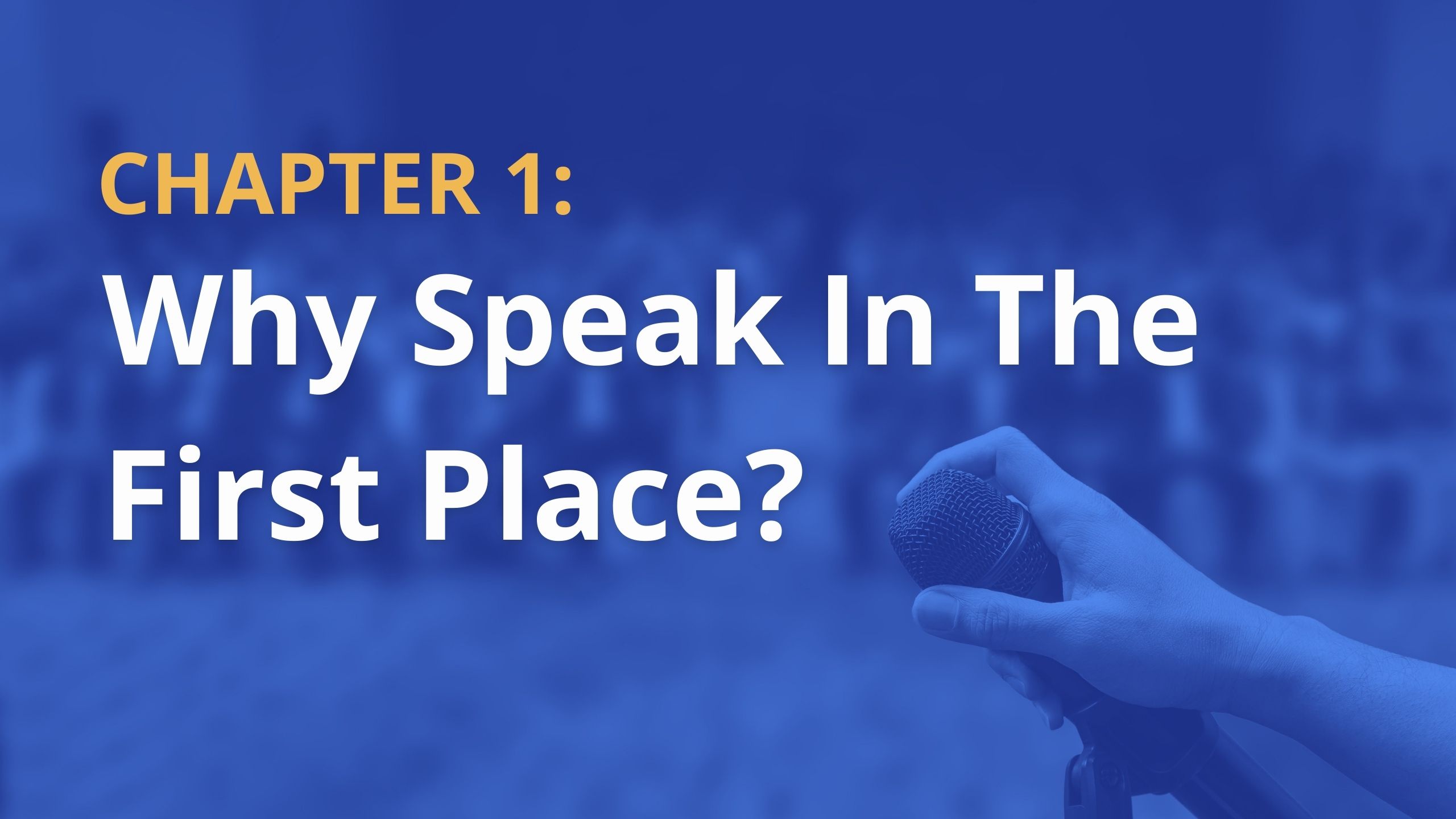
Get Booked To Speak: The Ultimate Guide
Do you have dreams of getting out there as a speaker?
Or perhaps, you are already a speaker and you want to learn how to get more speaking engagements and become an in-demand speaker.
Read on.
This guide is for you if you have questions such as:
- How do I get started to become a speaker?
- How do I become an in-demand speaker?
- What's the best way to hone your message and organize your talk?
- Where can I find more speaking gigs?
- What should I charge?
- What’s the best way to grow my thought leadership?
- How do I do all of this?
Whether you are an expert, coach, author, leader, or influencer, getting out there as a speaker is one of the best ways to earn more income, grow your expertise, and impact more lives.
Here’s Exactly What You’ll Learn:
- Chapter 1: Why Speak In The First Place?
- Chapter 2: The 3 Biggest Messaging Mistakes Amateur Speakers Make
- Chapter 3: How To Start Creating Your Message (Step-By-Step)
- Chapter 4: How Do Speakers Actually Make Money?
- Chapter 5: Speaking for FREE and Speaking for FEE
- Chapter 6: Where Do Professional Speakers Look for Gigs?
- Chapter 7: Work On These Speaking Skills To Stay Bookable
- BONUS: Want to give a TEDx talk? Do this.
This guide was created to help you learn the ins and outs of getting speaking engagements so you can earn more, build stronger thought leadership and change the world one talk at a time.
I used to be a hip-hop street performer in Boston and I had no clue at all about how to do this speaking stuff but I knew I wanted to be a speaker. Whenever I saw speakers speak on stages, on panels, etc, I was thinking “How the heck did they get booked and paid to speak?” Back then I didn’t know how to get started nor did I know what questions to ask. Fast forward to today, I speak on the topic of “public speaking” and I’ve had the opportunity to keynote and speak to hundreds of professionals and leaders at major events, conferences, and companies such as RE/MAX, ASICS, Delta Airlines, and more. Below I want to share everything I've learned with you, so you don't have to make the same mistakes and waste months or even years as a speaker.
Let's get started.
- Kit Pang
Founder, BostonSpeaks
Chapter 1: Why Speak In The First Place?
Public speaking offers you the opportunity to grow your thought leadership, earn more income, and change more lives.
Grow Your Thought Leadership:
Speaking gives you a chance to flex your credentials directly in front of a live audience. With qualifications and evidence to back up your words, you’ll be able to connect with people and prove your expertise. Answer their questions and solve the problems no one else has solved for them. Be valuable — or better yet, invaluable — to your audience and potential customer base. Gaining a profile, especially online, can be particularly difficult. Therefore, speaking engagements can be an incredibly effective way for businesses or individuals to show off their expert muscles to a live crowd.
Speaking allows you to build trust faster and more personally than other methods. This is a chance to be directly in front of your audience creating a relationship on the spot.
By getting your message out, building trust, and flexing your credentials, you’ll raise your value as a speaker and as an expert in your field. The people who come to watch you speak will come to trust you more. The more you speak, the more influence you’ll gain.
Earn More Income:
You don’t have to be a professional speaker to command a fee. In my first year of speaking, my highest paying speaking engagement was $5,000. I never thought that was even possible! I didn’t think it was within my reach mainly because back then I just transitioned from being a dancer to speaking about communication skills. So…don’t think you have to be the most well-known expert to speak to charge more.
When you know how to position yourself as a speaker who can deliver a talk that can change perspectives and lives, you’ll be able to feel more confident and charge what you’re worth. We’ll talk more about this later.
Change Lives:
You didn’t forget about your audience, did you?
Every single time you give a talk, you are helping your audience change their lives. You’re helping them make their lives easier because of the insights you have. You’re helping them see things in a brand new way. You’re helping them because they don’t even know they need help in the first place!
Have you ever been inspired by someone’s talk and started to see things differently?
Let me tell you about this one speaker that I was listening to - Jackson Galaxy, a cat expert (yes, I have three cats and I have catfighting issues, so why not listen to a presentation about cats). After hearing this talk, I COMPLETELY changed the way I looked at my cats, fed my cats, played with my cats, and more! I know this is a silly example but that talk not only helped me, but it also helped my cats.
- As a leadership speaker, can you imagine the power of your talk in helping leaders and their teams?
- As a finance speaker, can you imagine the power of your words in helping others to not live in fear over money problems?
- As a (fill in the blank) speaker, can you imagine all the lives you’ll be able to influence and help?
Don’t lose sight of your audience. Your audience is your #1 job as a speaker.
Okay, let’s get into it. How the heck do you actually get out there as a speaker and get booked?
It all starts with your message.
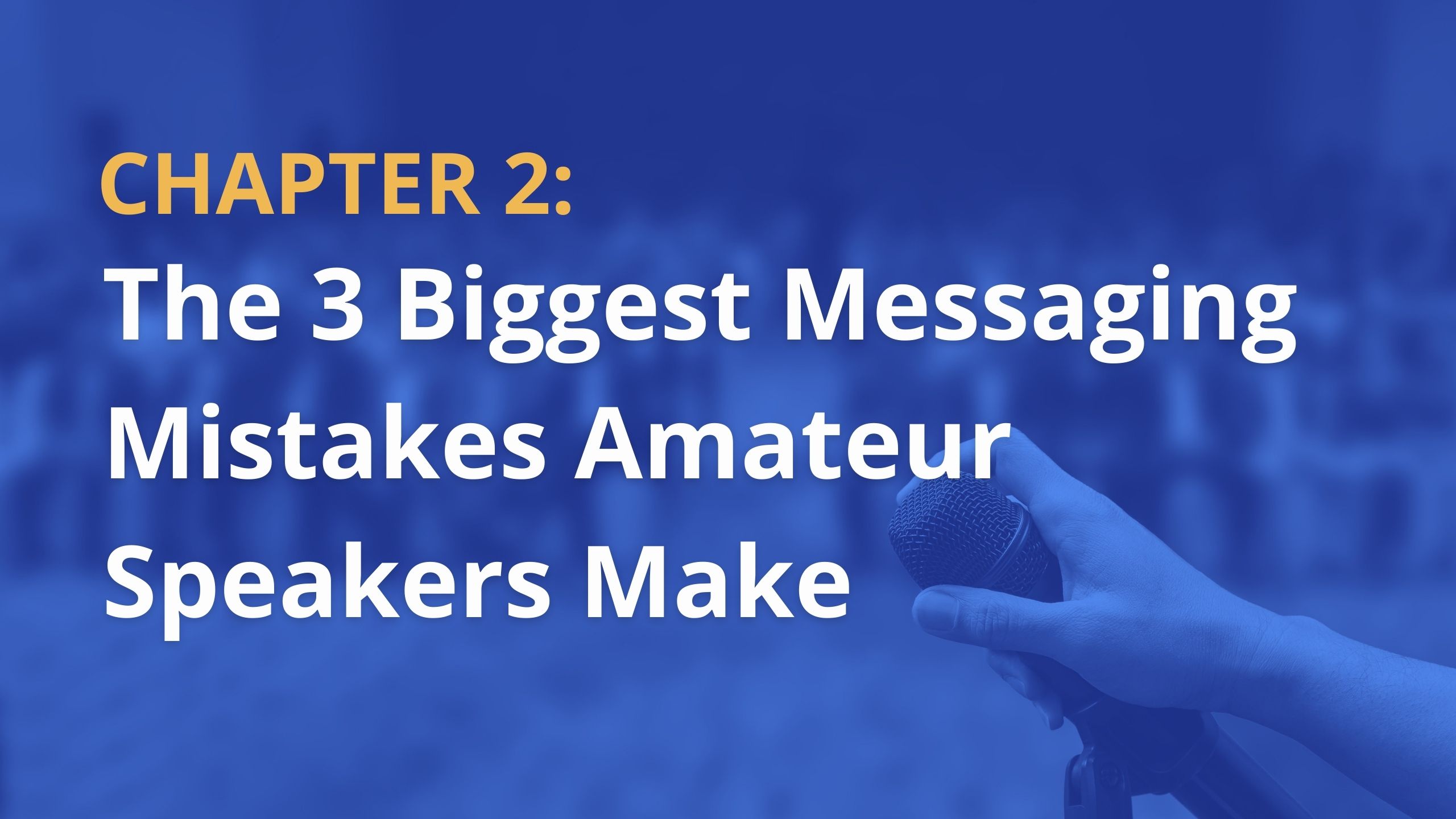
Chapter 2: The 3 Biggest Messaging Mistakes Amateur Speakers Make
As a speaker, your first step is to focus on your message.
Your message is what people and event organizers want. If you don’t have a clear focus on your message, you won’t make it far as a speaker.
Before we dive down into your message, check to see if you are making any of these mistakes:
Mistake #1 - You say YES to everyone even though it’s not your main message and you end up creating a new presentation every single time.
I’ll use myself for example. I use to speak about public speaking, listening, negotiation, and everything that fell under communication skills. Every time I said yes, I had to create a brand new presentation. I spent hours researching, learning, and making the slides look pretty. I was scared to say no to those opportunities because I wanted them all. By doing this, I’ve made my main thing weaker (and I didn’t know what my main thing was back then) and because the more I’ve spent time on other things, it gave me less time to make my one talk better. Your talk is your product. Make it better each time. This is the business of speaking, your speech is your product. Let me show you what I mean.
Solution #1 - Focus on one message and one talk at a time.
Let’s take a popular TED talk out there. Amy Cuddy - Power Posing (in a nutshell: stand in a power pose and you’ll feel more confident). That’s ONE Message. Guess what she can do with that talk? Give it everywhere around the world and she will still be in high demand. Why is that? When you give such a good talk, your audience will say this “Wow, that was so good, can you give that same talk to my audience?”.
The more time you spend on one message, you’ll be able to refine it. You’ll see what works and what doesn’t work. It’s your signature talk (think of a signature dish, the one that people come back to over and over). If you spend time speaking about everything, your main message will be weaker because it’s not getting refined.
Mistake #2 - People don’t know how to refer you because they don’t know how to explain who you are and what you speak about.
You know everything about your topic and what you talk about but other people have no clue. They can’t explain it as well as you do, they don’t understand what it is that you speak about, and they certainly don’t have the time. Many people want to be known for something that is unique and they make these funky names for themselves. Yes, you can do that when you are more popular but when you first start, go with something that other people already have context with.
Example: One speaker that I was working with wanted to be The Hype Speaker/Coach. I was like, “What’s The Hype Speaker?” I never heard about this before and I had no clue. When the person explained it to me, she wanted to be a speaker that gets people jazzed up. Now the way she explained it to me was compelling BUT here’s the problem….if people are searching for you, they will probably not type in Hype Speaker in Google because they are not aware of that term.
Solution #2 - Be Searchable.
If you were looking for yourself as a speaker, what would you type in Google?
Be known for something that other people already have some kind of context around OR what they are searching for.
You have to know this...the organizer who is trying to find you probably does not know anything about your topic at all. They just know the bare minimum and that’s what they will type into Google or what they will say when they ask a colleague.
Make it simple.
Mistake #3 - You are waiting to find the perfect message.
Maybe you’re waiting till you have enough expertise or you’ve been on a thousand stages before you find your message. There is no perfect message, there’s only the message that you can keep on making better. Also, I’m not saying that you have to stick to one message for the rest of your life, you can change it but just don’t do it too often.
Solution #3 - Start creating your one message.
One message, one year. For the entire year, focus on getting your one message out there. Hone it, mess it up, test it, make it better and keep on telling it. If you’re waiting for the perfect message, it will never come until you get it out there and keep on focusing on it.
Now, you've seen some of the biggest mistakes when it comes to your message.
Here’s how to start creating your message.
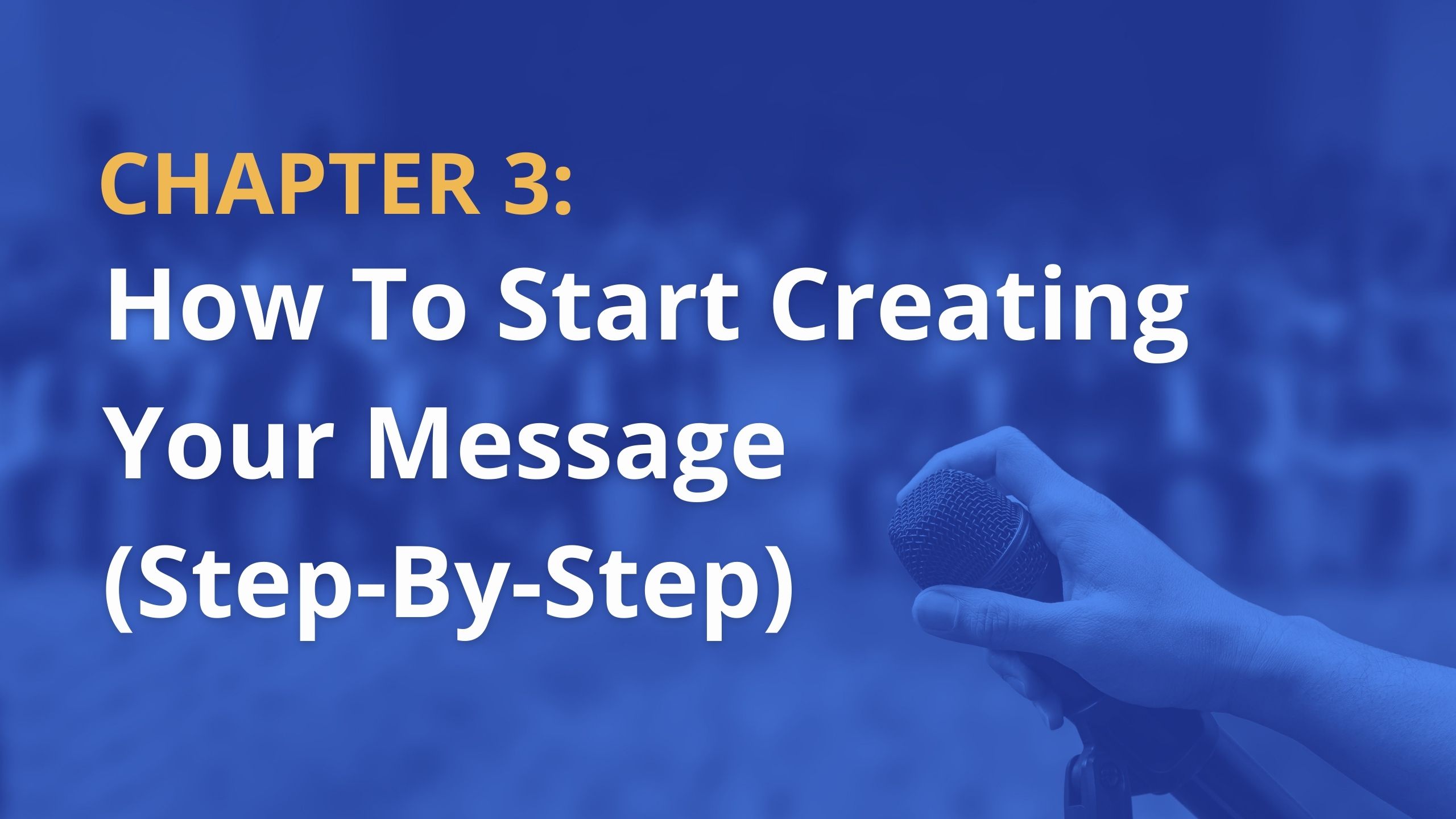
Chapter 3: How To Start Creating Your Message (Step-By-Step)
1) Focusing Your Message:
- Who do you want to be known for? If someone was searching for you on Google, what would they type in?
- What’s the one problem that your talk solves?
Example: I want to be known for public speaking. The one problem my talk solves is how to beat speaking anxiety.
2) Create Your Signature Talk Description:
Your signature talk description will help organizers understand what your talk is about, who it’s for and what problem it solves.
- Create a Title
- Create a Description
- Include 2-3 sentences about the importance of the topic
- Tell them who it’s for
- Tell them why the audience needs to hear this message now
- Add 3 - 5 bullet points of takeaways/learning objectives
- Bio - Why you are the perfect person to talk about this topic
3) Craft a Think - Want - How Presentation
You’ll need to be able to create a Think, Want, How presentation. I go way more in-depth about this process with my clients but this is going to be a pretty good starting point.
The thing is…most amateur speakers only give a HOW Presentation (aka..the steps on how to do this and that).
The top speakers get paid the big bucks because they don’t leave out the Think and Want portion (Getting them to understand your big idea and creating the want for your big idea). Don’t just give them the HOW, it’s your job as a speaker to make your audience believe and want your big idea.
Example of a Think Presentation? Simon Sinek’s talk on Start With Why.
If you go on YouTube and watch it, here are some of the comments for Simon’s talk. Pay attention and see how this talk shifted how people think.
- "It's the best TED video I have ever seen....it was worth watching & has changed the way I think & do work. Thank you Simon!!"
- "Even after so many years, this talk by Simon will always be relevant and inspiring."
- "I've watched this video 10 times - I learn something every time I watch it."
If you go watch this talk, you’ll actually see that there are no HOW steps. It’s all about changing the way you think.
So how do you create a Think, Want, and How Presentation?
Here it is in a nutshell:
Intro (Situation - Challenge - Future - Question - Answer) - This intro will quickly get your audience on the same page and prime them for your message. You’ll need to describe the situation your audience is in, express out loud the challenges they are facing, give them hope by presenting the future that they want and painting a picture for them, frame your whole talk by proposing the question to solve and give them your answer - which is the main idea that sums it all up. Your answer is your idea, your answer is your concept, and your answer is best when it’s only one thing. For example, Simon Sinek’s answer was about Starting With Why (it’s even in the title!).
Section #1 (THINK) - Show the audience why this is the ultimate answer for your audience? (Mindset Shift - Make them think like how you think). Build up the importance and need of your answer/solution/idea. You are building the case for your idea. This section will help your audience start moving towards believing what you believe in before you show them how to do it all.
Section #2 (WANT) - Show your audience what’s in it for them? Make them want your idea. (A Feeling of Change). Show how this solution can solve their personal challenges. Address their personal concerns. What does life look like now and what can life look like in the future?
Section #3 (HOW) - Show your audience how they can start with ease. What do they need to do? how them the bird's-eye view of the plan and make it easy for them to visualize success + Show them the steps
Conclusion - Close your talk by hitting these areas:
- Step #1: Emphasize Your Main Points
- Step #2: Provide A Powerful Closing Story or Quote
- Step #3: Include a Strong Call-to-Action (CTA)
When you know how to effectively create a Think-Want-How presentation, it will help you get booked over and over again. If you would like more in-depth help with crafting your message, get in touch! Remember to double down on finding your message and hone your talk. Your talk is your product. You’ll soon find yourself named the foremost expert in your field and in high demand for speaking events all over the world.
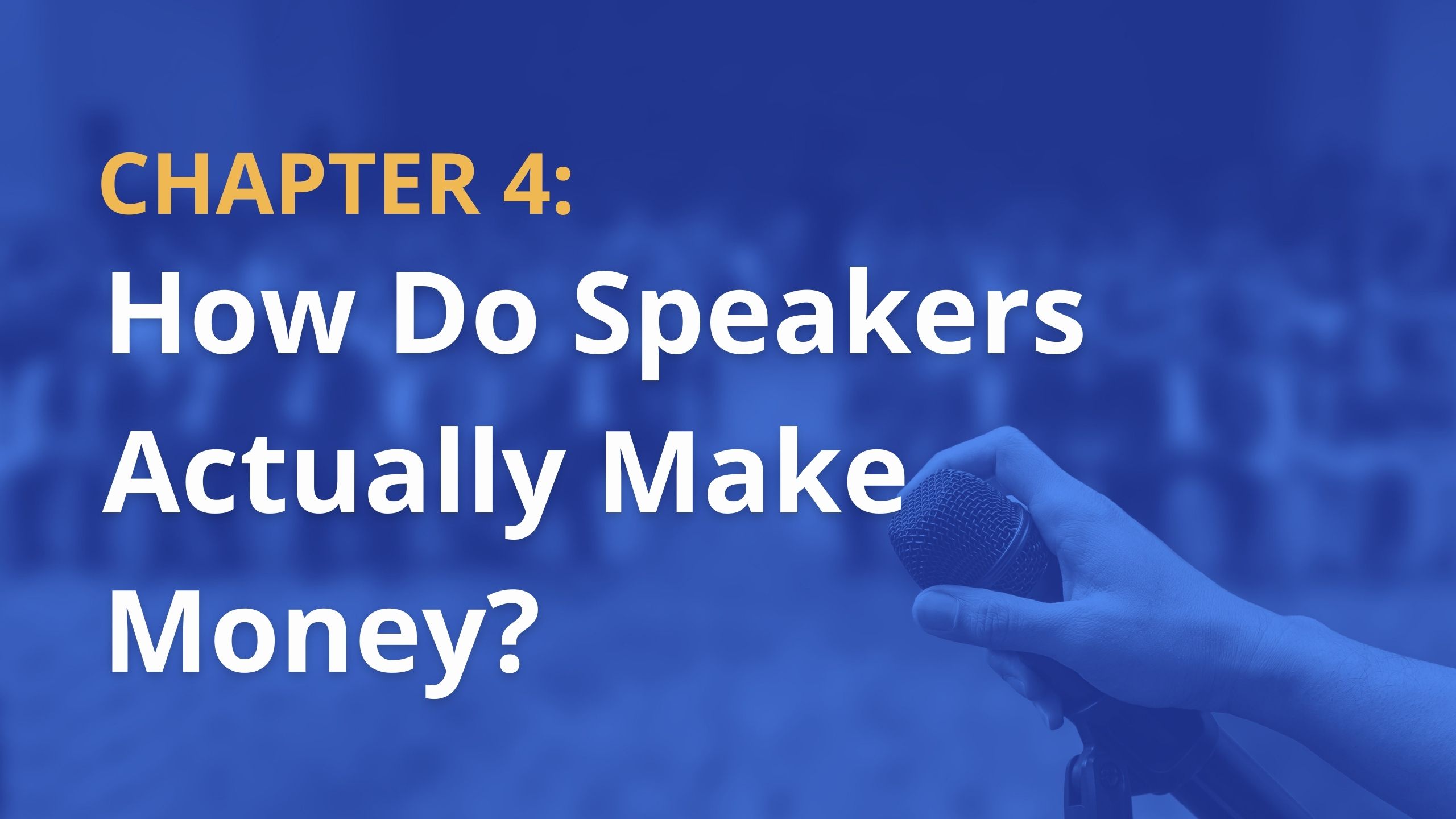
Chapter 4: How Do Speakers Actually Make Money?
When I first started as a speaker, I was clueless about being paid as a speaker. I first didn’t even know that people would pay them.
This section here basically answers the question, how do speakers make money? Where does it come from and why would people pay?
1. Keynotes, conference presentations, and personal platforms.
This is probably the job most people envision when they think of a professional speaker. Speakers in these fields are paid based on their expertise and ability to draw attendees to an event. If you are a keynote or conference presenter, you’ll be paid a fee for your time.
If you are a personal platform speaker like Tony Robbins, you are the event. Attendees pay to see you on stage and hear what you have to say. Headlining and hosting your own event represents the pinnacle of success for many professional speakers. Not only are you the star of the show, but you can also sell merchandise and other services to your audience.
2. Speaking as a day job.
Some organizations employ professional speakers as brand advocates or ambassadors. Other organizations hire you to speak or train their staff. In many cases non-profits or large organization wants a dedicated staffer to serve as their primary storyteller. As one of the “public faces” of the organization, your job is to speak and represent the organization by sharing their story and usually your story as well.
3. Being a seminar leader
Some speakers present full instructional seminars either alone or with a group of other speakers. This role is similar to that of a keynote speaker but usually takes more time and requires a more detailed presentation. The key difference between a seminar leader and a keynote speaker is that you are usually doing the training aka showing the HOW steps. This is a great gig if you enjoy sharing information and teaching.
4. Packaging your knowledge and expertise.
Many speakers are able to develop multiple revenue streams by creating different forms of content based on their knowledge and expertise. For example, if you know a lot about creating great user experiences, you might be asked to speak about UX at a digital marketing conference. But, then you’ve only shared your knowledge with the conference attendees. If you expand on that information to create an ebook, webinar, course, or podcast, then you can share your knowledge with more individuals and earn ongoing income from your product sales.
5. Coaching and consulting
Not every professional speaking gig has to be before a large audience. Personal coaching, consulting, and other smaller knowledge-sharing venues are a good way to stay busy and continue to earn income between bigger speaking gigs.
I love speaking before a crowd, but it is also very satisfying to help a single individual reach his or her goals by providing coaching and other services. Being able to take some time off the speaking circuit and meet with clients one-on-one lets me enjoy the best of both worlds — and you can too.
You Do You
These are just a few of the ways that professional speakers generate income. But they aren’t the only ways. It seems like there are new innovations and opportunities popping up every day. So don’t be afraid to try something new. Who knows? You might have the next great idea! Be yourself, value yourself, and enjoy the rewards of being a speaker.
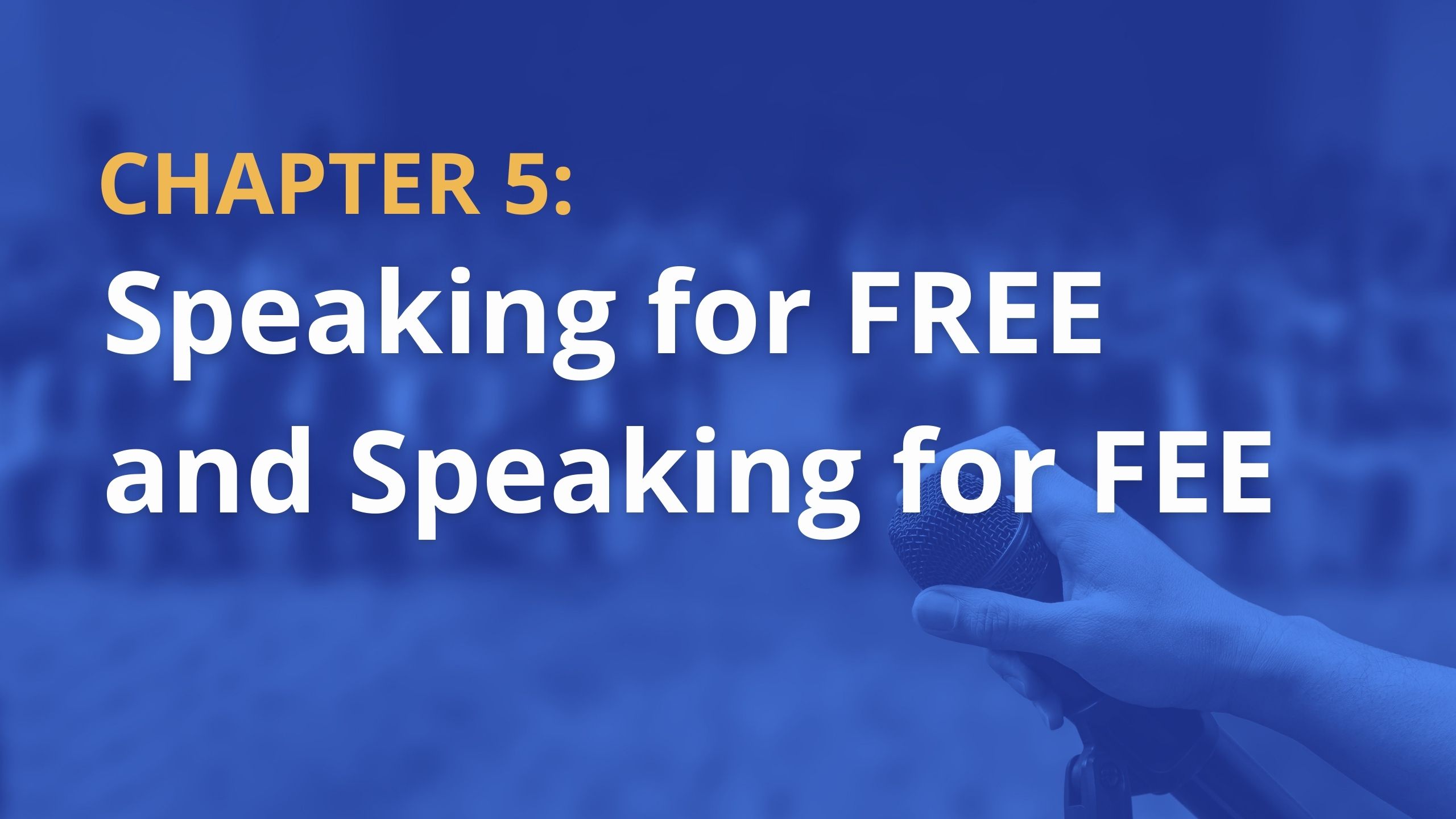
Chapter 5: Speaking for FREE and Speaking for FEE
Speaking For Free:
- By the time you’ve given 100 FREE talks/workshops/panel events (on the same topic) people will be ASKING you “how much do you charge?”
- If you are completely new and no one knows who you are, you want to build more credibility or you don’t have the public speaking skills set yet, follow option #1 and aim for those 100 FREE talks. (Hint: while you are giving your free talks, collect testimonials, videotape your talks, get photos). We’ll talk about how to get on these in-person or virtual stages later.
- Speak to give back to events, organizations, or people that you support. 9 out of 10, I usually say no to speaking for free unless it’s a group that I really want to support and help. As a speaker and leader you need to be careful with your time and what you’re worth, you can’t say yes to every organizer asking you to speak for free. My wife said this to me once..”Kit, you’re not a non-profit, stop doing everything for free.”
Speaking For Fee:
- Start Asking For A FEE: - If people are already asking you to speak at times and you just say “yes” because you’re scared you’re going to lose the opportunity, start asking for a fee. If they say no, that does not mean they will go with someone else, it just means they can’t (or don’t want to) pay but they still want you to speak.
- If you are ALREADY CHARGING - RAISE YOUR PRICES: Consider everything that you’re putting in to deliver this talk: Your time, your brain space, your dedication, travel, saying no to other priorities. How much is all that stuff worth? Yes, it’s more valuable than you think. The next time you say yes to a free opportunity, what are you losing out on? If you want to make more, raise your value by raising your prices. It’s as simple as that.
- Okay, how much should you charge? This is one of the best summaries of how much a speaker should charge from Dorie Clark
-
Newbie speakers might earn $500–$2,500 for a talk.
-
Beginning speakers, or those just establishing a brand with their first book, might earn $5,000–$10,000.
-
Those with several books and other forms of “social proof” might draw $10,000–$20,000.
-
Those who are very well-known in their field, such as best-selling authors, can bring in $20,000–$35,000 per talk.

Chapter 6: Where Do Professional Speakers Look for Gigs?
Let's say you got a talk and a great story to tell.. Now what?
It is time to start finding events that need a speaker.
Okay, but where?
Yeah, I might have forgotten to mention this before, but there aren’t a lot of job listings for professional speakers in the classifieds. Nope, not on Craigslist either (is that still around?)
But obviously, people hire professional speakers from somewhere. You just need to put yourself in the place where people are looking.
Let me tell you how to find those places.
Find Speaking Engagements by Following Your Interests
To begin your search for speaking engagements, think about who and what you know.
You’ll be speaking on topics that interest you and that you know a lot about. Where did you gain that knowledge? That’s probably where other people who are interested in the same subject are spending their time, too.
Use online resources, your personal network, and good old-fashioned legwork to find venues in need of a speaker.
While you’re looking for engagements, also invest time in getting to know your potential audience. Investing your time by spending it with the people you hope to reach with your story will help you craft the perfect message for them later.
Ready to begin your search?
- Keep an eye out for opportunities online.
Industry websites, online trade publications, special-interest forums, and social media groups are places where someone looking for a speaker on a particular topic might begin their search.
To choose where to look, make a list of the places you go and the resources you consult online when you are pursuing your interests. Then, get into the habit of scanning interest groups and publications for events and organizations that feature speakers. Pay attention to where speakers on topics similar to your own are being booked. They may have landed the gig this year, but next year the stage could be yours. Or, maybe you’ll decide to join forces and set up your own speaking event.
My associates and I have had great success creating special speaking events here in Boston. We publicize our events across social media and via our websites.
Here's a list of online sites where you can create your own event, find sites looking for speakers, or events where ou can contact the organizers.
- Eventbrite
- Meetup
- OnZoom
- Type in Google - "City" Conference Center" - sometimes these sites have a list of upcoming events at your closest conference center and call to speakers
- Type in Google - "Call For Speakers, City"
- Type in Google - "Your topic" call for speakers"
- Type in Google " City, online calendar events"
- Tell and show people you're a speaker.
This is going to sound silly but most people often overlook this. If people don’t know that you’re a speaker, they just don’t know!
Many times, people come to me and ask me how they can get out there more as a speaker and I go look at their LinkedIn page - they don’t post about speaking, they don’t have photos of them speaking, they don’t call themselves speakers.
Let people know that you speak by giving them a glimpse of your speaking by posting short videos (even when you’re speaking on Zoom, you can take a video on the side with your phone), setting up a speaker’s reel, and sharing it online, post photos of your speaking engagements, tell people that you’re a speaker on X TOPIC and why you’re passionate about it.
Once you’ve decided to begin seeking bookings, set up your website, social media pages, and Linkedin profile to do the “talking” for you. A few sentences explaining your what and why will help to quickly get the word out to people in your network.
Also, prepare a few scripted responses in advance to use when you meet potential leads. Be sure to plan different lengths and content for different situations. You should create a personal branding statement that sums you up in one sentence, but also write an elevator pitch version.
- Ask your connections to hook you up.
Next, tap into your personal network. Ask the people you are connected to if they are planning events that could use your expertise. Someone in your network might be on the planning committee for a corporate or non-profit event and be happy to add you to the program. Volunteering as a speaker for your favorite charity is a great way to get valuable experience and do good at the same time.
- Show up at conferences to show off your style.
Another method of finding speaking engagements is to make your case in person. For instance, if there is a conference that you’d really like to speak at next year, attend that conference this year. While you’re at the event, introduce yourself to the organizers and find out when they’ll begin booking for the next season. You might also ask for a summary of what they will be looking for in a speaker.
Talking to event organizers and corporate planners in person allows them to preview your style in a way that an email just can’t match.
- Stay in the loop.
Finally, many conference centers, chambers of commerce, and speakers’ guilds publicize upcoming events and speaking opportunities. Once you’ve decided to become one of us, it is important to follow the industry news by subscribing to the newsletters or regularly checking the websites of these organizations.
I check the Boston Convention and Exhibition Center website regularly to stay updated on what’s happening here in my backyard.
Well, that’s it then. A little bit of research, monitoring the proper channels, and activating your network should help you find the perfect gig. Then, you can share your story and inspire your audience.
Lastly, you have to keep up your speaking skills because at the end of the day, if you can’t speak, you won’t get booked!
What are some key speaking skills to focus on?
That’s what we’ll talk about next.
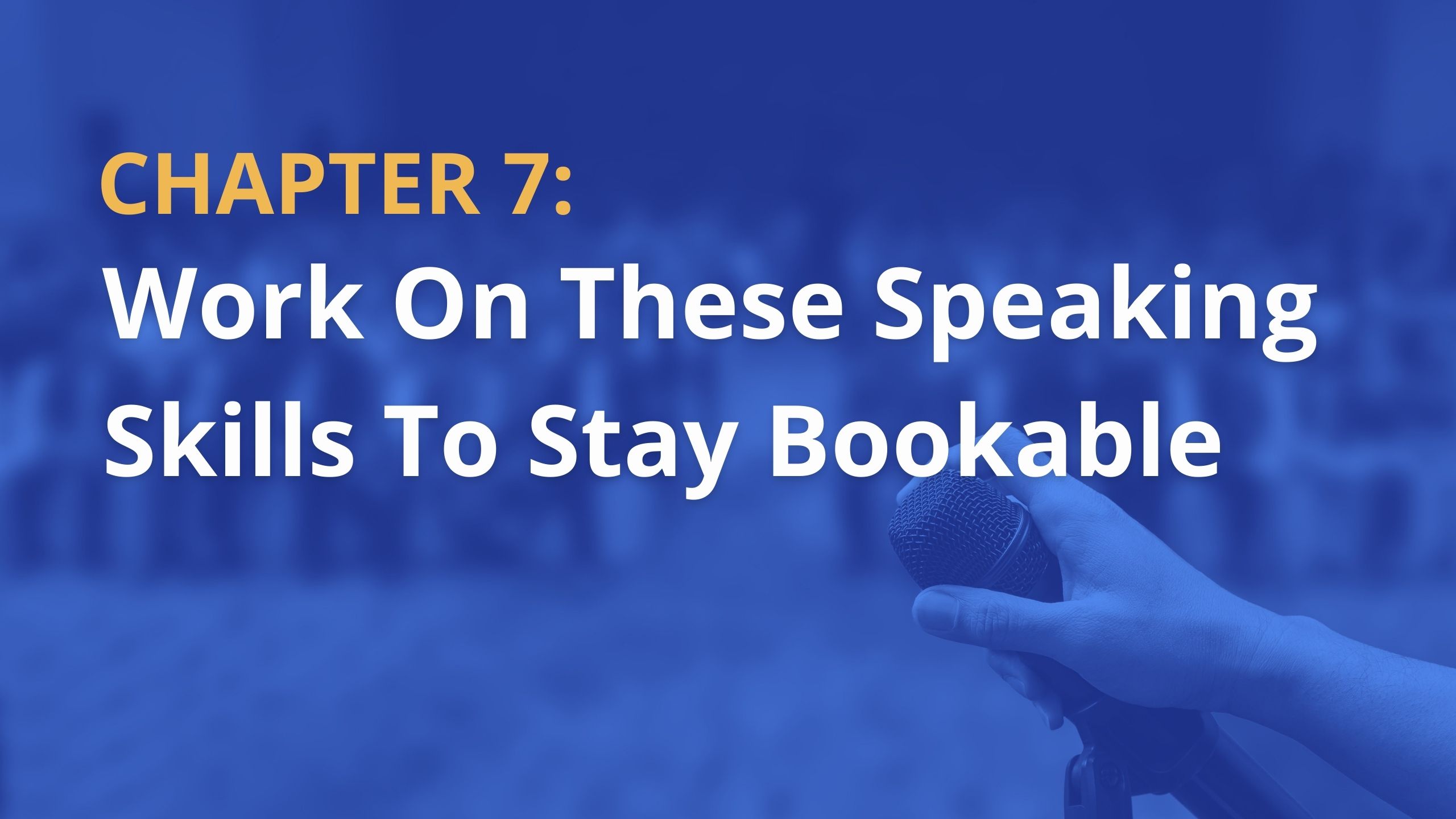
Chapter 7: Work On These Speaking Skills To Stay Bookable
Confidence and authenticity — Imagine how easy it will be to speak to a single customer or prospect once you’ve mastered sharing your story with a whole group of strangers. Improving your speaking skills can help you overcome the natural nervousness most people feel when asked to make a presentation before strangers. As you become a better speaker, you’ll also become a more authentic communicator.
Body language and situational awareness — An important part of learning to speak in front of an audience is self-awareness. A speaker needs to be able to use motions and gestures to complement their speech, not distract from it. To be truly comfortable onstage, you have to be in control but not self-conscious. That skill takes a little practice.
Voice modulation and control — When you speak, your voice becomes an instrument that communicates not just the spoken words but also emotion and emphasis. Like an instrument, you can adjust your rhythm and tone to enhance your presentation. Learning to recognize your off-notes is another one of the skills professional speaking develops.
Storycrafting — Talking is an ability, storytelling is an art. Professional speakers learn to encourage and inspire by telling a great story. Speakers who can tell a compelling story with their customers as the star have the map to success.
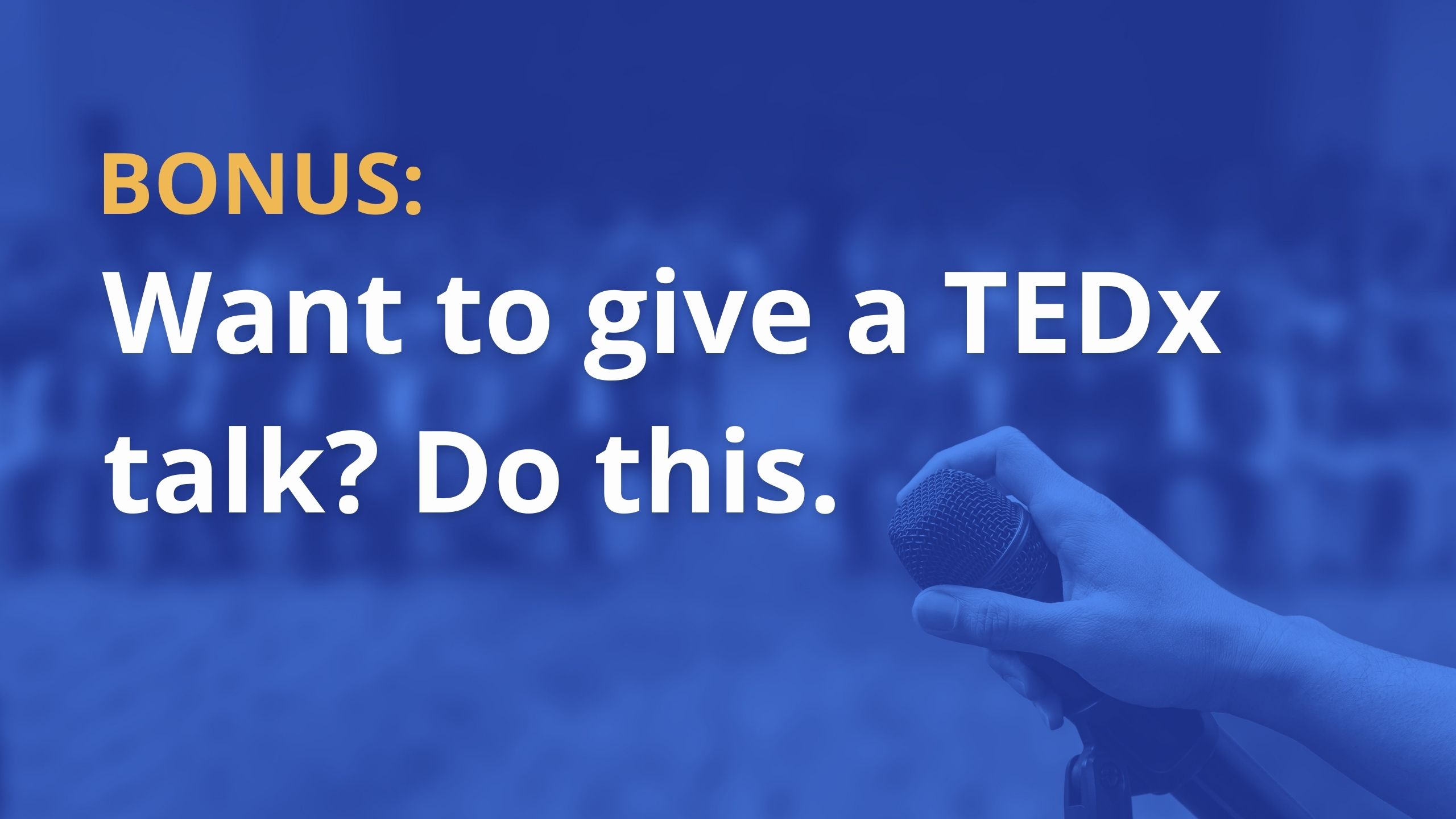
BONUS: Want to give a TEDx talk? Do this.
Here’s a free training where I reveal exactly how to find TEDx opportunities and what you can do to land your first or fifth TEDx talk. I hold nothing back.
***
That’s a wrap.
Go get out there as a speaker.
Two last reminders.
- If you’re not asking for money as a speaker, start asking.
- If you’re already asking for a fee, start asking for more.
-Kit

